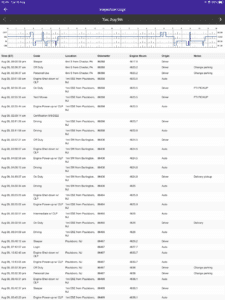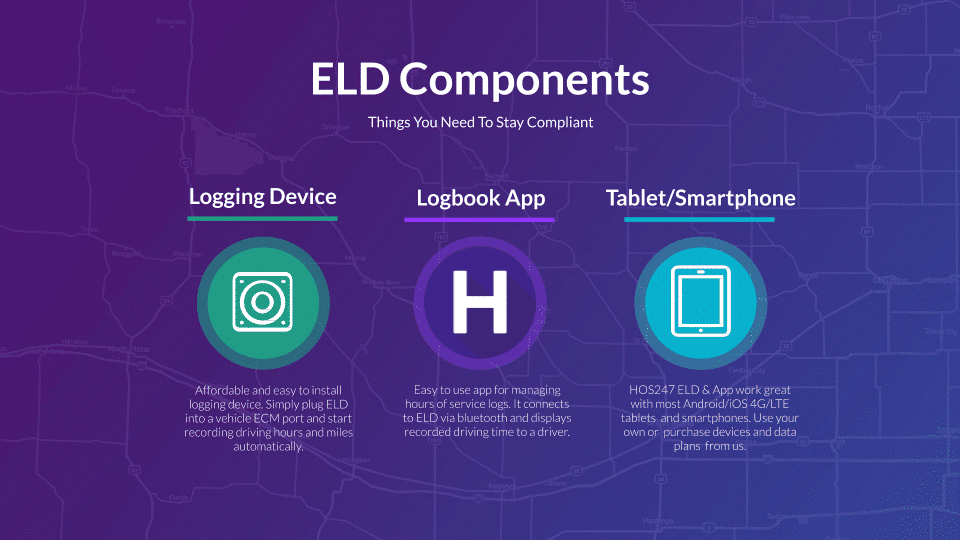In the world of trucking, where compliance with rules and regulations is necessary for efficient and productive operations, having a dependable commercial truck log book is crucial. Drivers’ logs, originally kept on paper, are used by authorities to verify hours of service (HOS) compliance. In this guide we will go through the basics of these records, Transport Canada regulations, and the importance of choosing a reliable electronic log.
Types of Log Books: Paper vs. Electronic

Log books, once actual notebooks filled manually by the driver, have been the rule in Canada for decades. With the advancement of technology, logs have evolved to digital records and Transport Canada now enforces the Electronic Logging Device (ELD) Mandate for most commercial drivers.
ELDs capture vital data directly from the engine for accurate driving time, engine hours, vehicle movement, and location data, which reduces error margins significantly. Any record not obtained through these devices, even if computerized, is considered a paper log by the authorities.
The transition to ELDs has not been easy on all drivers. However, the need for electronic log books for commercial trucks is undeniable and accurate record-keeping can serve as a valuable asset for fleet managers, optimizing the entire transportation operation.
Challenges for Truckers
The world of commercial trucking poses many challenges for drivers, such as maintaining strict compliance with HOS and commercial truck log book rules. These obstacles, though complex, can be effectively overcome through efficient management and the adoption of reliable logbook solutions.
1. HOS Violations
One of the primary challenges faced by truckers is the constant concern of HOS violations. Striking a balance between meeting delivery deadlines and taking the mandated rest periods can be delicate. To overcome this challenge, careful route planning is indispensable. By planning routes that allow enough time for rest breaks and unforeseen delays, truckers can navigate their schedules with precision, reducing the risk of violations and ensuring road safety for all.
2. Falsification of Logbooks
In the past, paper logbooks were susceptible to falsification, enabling some drivers to bend the rules. However, electronic logging has eliminated the possibility of manual tampering. Inaccurate records have been replaced by automatic, real-time tracking, ensuring compliance without compromises.
3. Technical Glitches and User Errors
While ELDs can offer numerous benefits, they are not without their challenges. Technical glitches or user errors can disrupt the logging process, leading to potential compliance issues. To address this, reliable ELD providers, such as HOS247, offer responsive customer support to address technical issues promptly and provide guidance to drivers and fleet managers.
4. Consequences of Non-Compliance
Non-compliance with HOS regulations and logbook requirements carries severe consequences. Penalties, fines, and potential legal action can damage a trucker’s record and impact their livelihood. By using reliable logbook solutions and adhering to regulations, truckers not only safeguard their careers but also contribute significantly to road safety.
By acknowledging these challenges and implementing proactive strategies, truckers can navigate the roadblocks to compliance effectively. Quality ELD solutions, coupled with proper training and planning, help truckers high standards in regards to the service provided and the efficiency of operations. In the upcoming section, we will delve into the importance of reliable logbook solutions, and the role they play in addressing truckers’ pain points.
Choosing Reliable Logbook Solutions
The choice of a log book solution can greatly impact commercial trucking businesses. Experienced providers, such as HOS247, act as a compliance partner for carriers navigating the road. To make sure you get a user-friendly experience and make the most out of your commercial truck driver log book, research your provider and look for the qualities of a reliable electronic log.
User-Friendly Interface
Logbook solutions should be tailored to address truckers’ unique challenges. Intuitive interfaces simplify the logging process, allowing drivers to focus on their primary task: driving. Clear prompts, easy data entry, and real-time updates reduce the learning curve, making it accessible even for those less tech-savvy. Ask for a demo to verify the system is easy to learn.

Responsive Customer Support
Issues can arise at any moment and knowledgeable support teams act as lifelines for truckers facing technical glitches or seeking guidance. Successful ELD providers recognize the importance of responsive customer support. Swift, effective support ensures that disruptions are minimized, allowing truckers to focus on their routes with confidence. It is advisable to read some user reviews from potential providers’ clients or give a call to their support line.
Insights for Fleet Managers
Beyond individual truckers, logbook solutions empower fleet managers with invaluable insights. Extra features, such as GPS tracking, idle monitoring, IFTA calculations, and more, enable managers to optimize operations and improve profitability. This approach enhances operational efficiency and fosters a culture of compliance within the entire organization.
In commercial trucking, where compliance is not just a choice but a necessity, reliable logbook solutions are indispensable allies. By addressing truckers’ pain points, simplifying complexity, and providing unwavering support, these solutions can contribute to the company’s bottom line.
Key Transport Canada Commercial Truck Log Book Rules

Understanding Transport Canada’s HOS regulations is essential for truckers and fleet managers to maintain compliance and ensure road safety. Here’s a breakdown of the key regulations:
- Daily driving limit. Transport Canada mandates a maximum of 13 hours of driving in a day for commercial vehicle operators. After accumulating 13 hours of driving, drivers are required to take at least 8 consecutive hours of off-duty time.
- Work shift limit. Drivers must not work more than 14 hours in a day, which includes driving time and all other work-related activities. After reaching the 14-hour limit, drivers must take a minimum of 10 consecutive hours of off-duty time.
- Daily on-duty limit. In addition to driving time, drivers are allowed a maximum of 14 hours on duty in a day. This includes driving, loading, unloading, paperwork, and any other work-related tasks.
- Weekly driving limit. Transport Canada sets a weekly driving limit of 70 hours. This means drivers cannot exceed 70 hours of driving within a period of 7 consecutive days.
- Off-duty time. Drivers are required to take at least 24 consecutive hours of off-duty time within a period of 14 days. This ensures drivers have sufficient time for rest and recovery.
- Exemptions and special circumstances. Certain exemption categories are specified in the law for specific commercial drivers. Additionally, special circumstances like adverse driving conditions permit exceptions to HOS rules, enabling drivers to adapt to unexpected situations without violating regulations.
HOS247 commercial truck log books support all current HOS and ELD regulations to help truckers achieve compliance. Request a demo or try our system for two weeks to explore its full potential.

As an expert in B2B and B2C sales, I’ve dedicated myself to perfecting sales processes and client retention strategies in the logistics and trucking industry. I have significantly contributed to the expansion of the ELD service, catering to retail and wholesale clients in need of HOS247 ELD solutions. My unwavering commitment to implementing state-of-the-art sales techniques and technologies ensures the continuous growth and success of businesses I work with.












The world of trucking has come a long way since the days of paper maps and CB radios. Technology has revolutionized how fleets operate, and GPS tracking is at the forefront of this transformation. 4G vehicle tracking systems are reshaping

Elogs for truckers help businesses in the transportation and trucking sectors with HOS compliance and productivity. Carriers must use them to comply with the mandatory federal requirement for drivers to keep their RODS electronically; however, they can also be an

CDL driver log books are a vital tool for carriers and drivers. It is important to purchase the right ELD solution to make sure driving operations can carry on efficiently. So, which CDL electronic logbook should fleet managers and owner